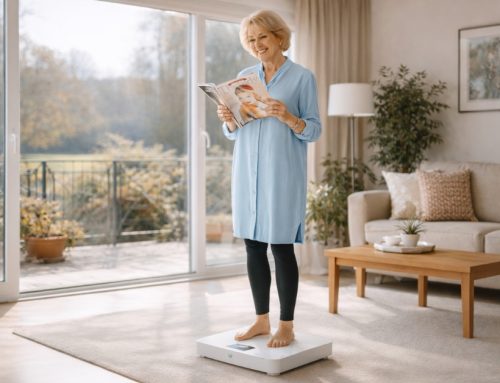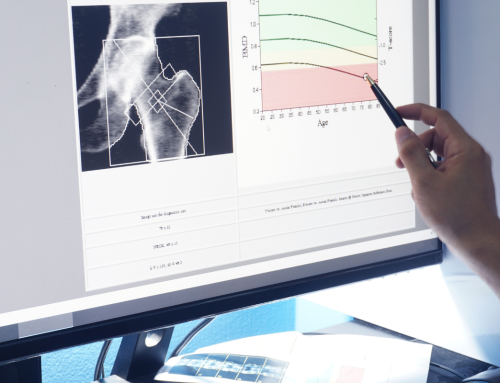
Your bones are more than just structural support—they store essential minerals, enable mobility, and provide protection. But did you know that thyroid disorders can impact your bone health? Conditions such as hyperthyroidism (overactive thyroid) and hypothyroidism (underactive thyroid) can influence bone density and increase the risk of osteoporosis.
Understanding this connection between thyroid issues and bone health is key to safeguarding your skeletal strength if you or someone you know is managing thyroid issues. Here's everything you need to know, including actionable tips to maintain healthy, resilient bones.
What Is Osteoporosis?
Osteoporosis, which translates to "porous bones," is a condition that weakens the bones, making them fragile and more prone to fractures. Common fracture sites include the wrist, hips, and spine.
Within your bones, two types of cells work continuously to maintain strength and stability:
- Osteoclasts break down damaged or old bone material.
- Osteoblasts rebuild bone tissue by producing new material.
A delicate balance exists between these two processes. When that balance tips—due to aging, hormonal changes, or specific medical conditions—bone loss occurs faster than bone replacement, leading to osteoporosis.
The Connection Between Thyroid Issues and Bone Health
The thyroid gland produces hormones that control your body's metabolism, growth, and energy use. These hormones also play a significant role in regulating bone remodelling cycles, which means thyroid disorders can directly influence your bone health.
1. Hyperthyroidism (Overactive Thyroid)
When the thyroid is overactive, it produces more thyroid hormones than the body needs. This excess hormone accelerates the bone turnover process, speeding up the activity of osteoclasts (bone breakdown cells). Unfortunately, the corresponding activity of osteoblasts (bone-building cells) doesn’t keep pace, resulting in bone loss.
Key Points to Remember:
- Prolonged hyperthyroidism can lead to significantly low bone density, raising the risk of osteoporosis.
- This is particularly concerning for postmenopausal women who already face hormone-driven bone challenges.
- Treating hyperthyroidism can slow bone loss and earlier intervention results in better outcomes.
2. Hypothyroidism (Underactive Thyroid)
While hypothyroidism in itself is not typically associated with significant bone loss, the treatment for this condition requires attention. Patients are often prescribed levothyroxine, a replacement thyroid hormone, to normalize their hormone levels.
Over-supplementation of thyroid hormones can lead to a state resembling hyperthyroidism, where excessive thyroid hormone levels inadvertently accelerate bone turnover.
Key Points to Remember:
- Hypothyroidism may indirectly affect bones if hormone replacement therapy isn’t closely monitored.
- Regular blood work ensures thyroid levels stay within the ideal range.
How to Maintain Bone Health With Thyroid Issues
Fortunately, there are many ways to protect and promote bone health, even if you're managing a thyroid condition. If you have a thyroid disorder, here are some practical tips to minimize your risk of osteoporosis and maintain strong bones:
1. Eat a Bone-Healthy Diet
Nutrition plays an essential role in safeguarding bone health.
- Calcium is the building block of strong bones. Adults need around 700 mg daily or up to 1,000 mg if they’re at risk of osteoporosis. Include calcium-rich foods like dairy, leafy greens, soy, and fortified alternatives.
- Vitamin D helps your body absorb calcium more effectively. Incorporate foods such as oily fish, egg yolks, or fortified cereals, and make sure to get some sunlight exposure. If needed, consider supplements as recommended by your doctor.
- Protein supports both bone and muscle health. Ensure your diet includes enough lean meat, legumes, and nuts.
2. Engage in Weight-Bearing Exercises
Physical activity is vital for bone strength.
- Incorporate regular weight-bearing exercises like walking, jogging, or strength training into your routine. These exercises stress bones in a way that promotes new tissue formation.
- Add balance-enhancing exercises like yoga or tai chi to help reduce the risk of falls and fractures.
3. Make Key Lifestyle Adjustments
Simple lifestyle changes can significantly impact bone health.
- Quit smoking, as it harms both thyroid and bone health.
- Limit alcohol consumption to reduce its detrimental effects on bone density.
- Maintain a healthy weight, as being underweight or overweight can increase your risk of bone fractures.
4. Partner With Your Doctor
Regular medical care can help manage your thyroid condition and protect your bones.
- Bone density testing can help evaluate your risk of bone loss and osteoporosis, especially if you’ve had untreated hyperthyroidism or other risk factors.
- Monitor thyroid treatment through regular check-ups to ensure your thyroid hormone levels are balanced.
5. Explore Innovative Bone Health Solutions
Science-backed tools can complement traditional methods.
- Low-intensity vibration therapy devices, such as Marodyne LiV, help naturally stimulate bone cells and promote healthy bone formation. Consider integrating these into your routine after consulting your healthcare provider.
Your thyroid gland has a significant role beyond regulating metabolism—it also contributes to bone health. Whether you're managing overactive or underactive thyroid conditions, being proactive about maintaining your skeletal health is vital.
By understanding the connection between thyroid issues and bone health, adopting a nutrient-rich diet, staying active, and working closely with your healthcare provider, you can confidently take steps to protect your bones and reduce the risk of osteoporosis.
If you want additional support in your bone health journey, consider exploring cutting-edge, drug-free solutions like low-intensity vibration therapy with Marodyne LiV. Clinically tested and backed by decades of research, this innovative therapy is tailored to strengthen your bones naturally and safely. Strengthen your foundation today—learn more about Marodyne LiV and take control of your bone health with confidence.
How do you prioritize bone health in your daily routine? Have you explored any other innovative therapies or techniques for strengthening your bones? We'd love to hear from you! Share your thoughts and experiences in the comments below.




 Black Friday → Christmas Sale! Save $300 + Free Shipping
Black Friday → Christmas Sale! Save $300 + Free Shipping 